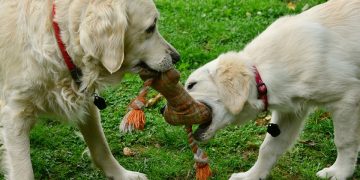Living with a dog can be one of the most joyful experiences in life. Dogs offer unconditional love, companionship, and loyalty that enrich our lives in countless ways. But as a responsible pet owner, it is essential to ensure that our furry friends are healthy and happy throughout their lives. In this ultimate guide, we will discuss key factors that contribute to your dog’s health and well-being, and provide valuable tips to help you keep your canine companion in top shape.
Nutrition
Proper nutrition is the foundation of your dog’s health. A well-balanced diet provides essential nutrients that support your dog’s overall well-being, including immune function, digestion, and energy levels. When selecting a dog food, look for high-quality ingredients, such as real meat, whole grains, and vegetables. Avoid foods with artificial preservatives, colors, and fillers. It is essential to consult with your veterinarian to determine the best diet for your dog based on factors such as age, breed, and activity level.
Regular Exercise
Just like humans, dogs require regular exercise to maintain their physical and mental health. Daily walks, play sessions, and activities such as fetch or agility training are excellent ways to keep your dog active and engaged. Regular exercise helps to prevent obesity, strengthen muscles, improve cardiovascular health, and enhance mental stimulation. Be sure to tailor your dog’s exercise routine to their age, breed, and fitness level to prevent injuries and promote overall well-being.
Veterinary Care
Regular veterinary checkups are essential for maintaining your dog’s health. Annual exams, vaccinations, and preventive care, such as flea and tick prevention, heartworm medication, and dental cleanings, help to detect and prevent health issues before they become serious. Early detection and treatment of health conditions can improve your dog’s quality of life and longevity. Be sure to follow your veterinarian’s recommendations for vaccinations, deworming, and parasite control to keep your dog healthy and happy.
Grooming
Regular grooming is another crucial aspect of your dog’s overall health and well-being. Brushing your dog’s coat helps to remove loose hair, prevent matting, and distribute natural oils that keep their skin and coat healthy. Regular baths, nail trims, ear cleanings, and dental care are also important to maintain your dog’s hygiene and prevent infections. Additionally, grooming sessions provide an opportunity to bond with your dog and monitor their physical condition for any signs of health concerns.
Mental Stimulation
In addition to physical exercise, mental stimulation is essential for keeping your dog happy and mentally sharp. Interactive toys, puzzle feeders, training sessions, and games such as hide-and-seek or scent work help to engage your dog’s mind and prevent boredom. Mental stimulation can reduce anxiety, destructive behaviors, and attention-seeking behaviors, while promoting mental acuity and problem-solving skills. Be sure to provide a variety of enrichment activities to keep your dog entertained and mentally stimulated.
Socialization
Dogs are social creatures that thrive on companionship and interaction with other animals and people. Early socialization is crucial for developing your dog’s social skills, confidence, and ability to adapt to new environments. Expose your dog to a variety of people, animals, sights, sounds, and experiences to help them feel comfortable and confident in different situations. Regular socialization helps to prevent fear, aggression, and anxiety, while promoting positive interactions and relationships with others.
Training
Training is not only a way to teach your dog basic commands and manners but also a means to build a strong bond and mutual respect between you and your furry friend. Positive reinforcement training methods, such as treats, praise, and play, help to motivate and reward desirable behaviors, while discouraging unwanted behaviors. Consistent training sessions and clear communication help your dog understand expectations and boundaries, and promote obedience, confidence, and trust. Be patient, consistent, and positive in your training approach to help your dog learn and grow.
Love and Attention
Above all, love and attention are the most important factors in keeping your dog healthy and happy. Dogs thrive on affection, praise, and attention from their human companions. Spend quality time with your dog, such as cuddling, playing, going for walks, and engaging in activities that you both enjoy. Show your love through physical touch, verbal praise, treats, and rewards to strengthen your bond and foster a deep connection with your dog. Remember that your dog’s happiness and well-being depend on the love and care that you provide each day.
Conclusion
In conclusion, the key to keeping your dog healthy and happy lies in providing proper nutrition, regular exercise, veterinary care, grooming, mental stimulation, socialization, training, and love and attention. By incorporating these essential components into your daily routine, you can ensure that your canine companion lives a long, happy, and fulfilling life. Remember to consult with your veterinarian for personalized advice and recommendations to meet your dog’s specific needs. With your dedication and commitment, you can provide the best possible care for your beloved dog and create lasting memories that you will cherish for years to come.















































Comments 1